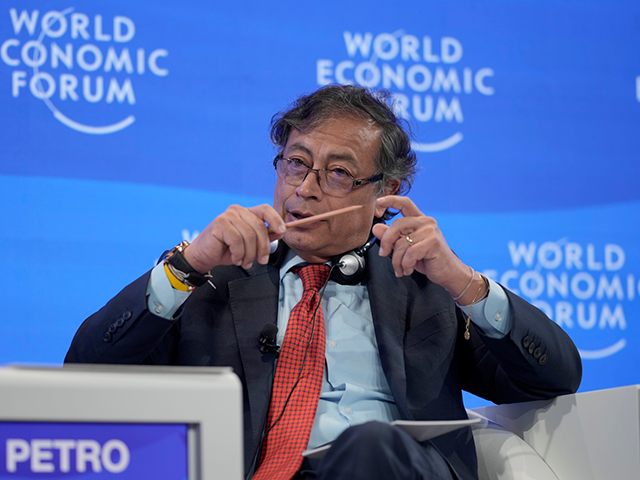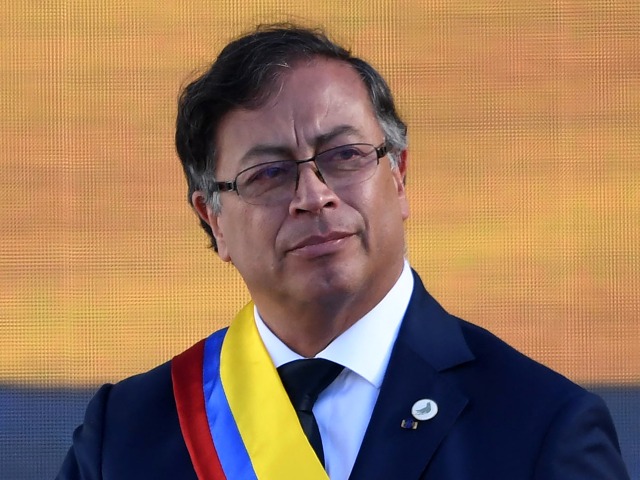Colombia’s far-left President Gustavo Petro announced plans this week to assemble a Constituent Assembly to rewrite the nation’s constitution, allowing him to insert into the new constitution leftist reforms his government has failed to pass through Congress.
Petro’s announcement echoed similar plans made by other far-left governments in the region in the past two decades, such as Venezuela, Bolivia, and Ecuador.
Chilean leftists ad attempted to do the same in their country, but a lengthy four-year process resulted in the rejection of two different constitutional proposals, a far-left one in 2022 and a conservative-leaning one in 2023.
Colombia’s current constitution was implemented in 1991 through a constituent assembly process that included the participation of Colombian guerilla groups, including M19.
Petro, a former member of the Marxist M19 guerilla and Colombia’s first leftist president ever, has spent his term in office, which began in August 2022, attempting to implement a series of far-left reforms to Colombia’s economic, political, healthcare, and social structures.

File/President of Colombia Gustavo Francisco Petro Urrego talks on a podium at the World Economic Forum in Davos, Switzerland, on Wednesday, Jan. 18, 2023. (AP Photo/Markus Schreiber)
So far, none of the leftist reforms that Petro has advocated for have been able to pass in Congress. Using Congress to push the nation leftward became more difficult for Petro after the ruling Historic Pact leftist coalition lost its majority in Congress following the departure of the Social Party of National Unity from the alliance in May 2023.
Petro’s healthcare reform plan, a flagship of his campaign, was once again rejected by the Colombian Congress last week after enough members of the corresponding Senate commission expressed their intention to vote to shelve the project.
The “sinking” of the healthcare reform prompted Petro to threaten on Saturday to pass the reforms via a Constituent Assembly if the country’s institutions “are not capable of being up to the level of the reforms” Congress has blocked.
“The national constituent assembly must transform the institutions so that they obey the people in their mandate for peace and justice, which is easy to achieve in Colombia,” Petro said during an official event.
On Monday, Petro explained the details of his constituent assembly proposal on social media. The far-left president asserted that the prospective constituent assembly does not seek to replace Colombia’s 1991 constitution nor will he “perpetuate himself in power,” as the current constitution was amended in 2015 to limit presidential terms to a single four-year one without the possibility of reelection.
“In the more than three decades that have passed since 1991, the powers constituted by the 91 constitution have not been able to solve several fundamental problems that hold back Colombian society and that is why the constituent, i.e. the people, must come in to solve them,” Petro opened his explanation.
Petro said that the first goal of the constituent process will be the “fulfillment of the peace agreement,” presumably with Marxist terrorist organizations such as the FARC and ELN. The process would also allegedly pursue agrarian reforms, the “inclusion” of the land and the “openly excluded population,” and “truth as the axis of justice.”
The second overarching goal, he asserted, will be to “guarantee in the short term the basic conditions of existence for the entire Colombian population: drinking water, health, and income for the older population.”
The third goal, Petro said, will be to “recover the objectives of the constitution of 1991, which were counter-reformed, in terms of prioritizing public education and agrarian reform.”
The fourth goal seeks to “constitutionalize” the fight against climate change and the “decarbonization” of the economy. Petro has repeatedly made calls to end the fossil fuel industry, accusing coal and oil of being more “poisonous” than cocaine. In September, during his participation at the 78th U.N. General Assembly, Petro insisted on the need to “decarbonize” capitalism.
Petro’s constituent assembly plans also call for justice reforms. The far-left president claimed that, in the past 30 years, Colombia built a justice system based on “punitive and politicized revenge.”
“We propose to take the judicial system towards obtaining the truth in order to seek reparation for the victims and to achieve social reconciliation as the ultimate goal as the end of the era of violence,” Petro said. “Truth is the prelude to all reconciliation and forgiveness.”
File/Chinese President Xi Jinping, right, shakes hands with Colombian President Gustavo Petro during a signing ceremony at the Great Hall of the People Wednesday, Oct. 25, 2023, in Beijing, China.(Ken Ishii/Pool Photo via AP)
Another of the reforms calls for a territorial reorganization of Colombia as implemented in the 1886 constitution. The territorial reorganizations would call for “autonomous” regions based on a “strong process of inclusion” to compensate for what Petro described as “the current and aberrant territorial inequality.” Other proposals include changes in monetary policy, the constitution of municipal coordinators of popular forces that “unleash the organization and the general mobilization of citizens,” and to “separate politics from private financing.”
“What will happen with the current reforms in Congress? If a majority formed in the seventh commission of the Senate annuls the bills arduously discussed in Congress, it will annul the process of a calm and orderly transition,” Petro said.
Colombian law states that both chambers of Congress must approve a law to begin a new constituent assembly process, which will then be put up for a vote in a referendum. If the Colombian electorate agrees to begin the process, then a new election will take place to choose the members of the assembly.
Colombian citizens and opposition parties have organized peaceful protests across the nation’s main cities to denounce Petro’s far-left reform plans, with the most recent one taking place in early March.
Christian K. Caruzo is a Venezuelan writer and documents life under socialism. You can follow him on Twitter here.
